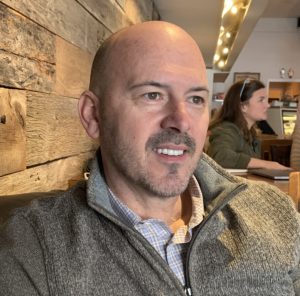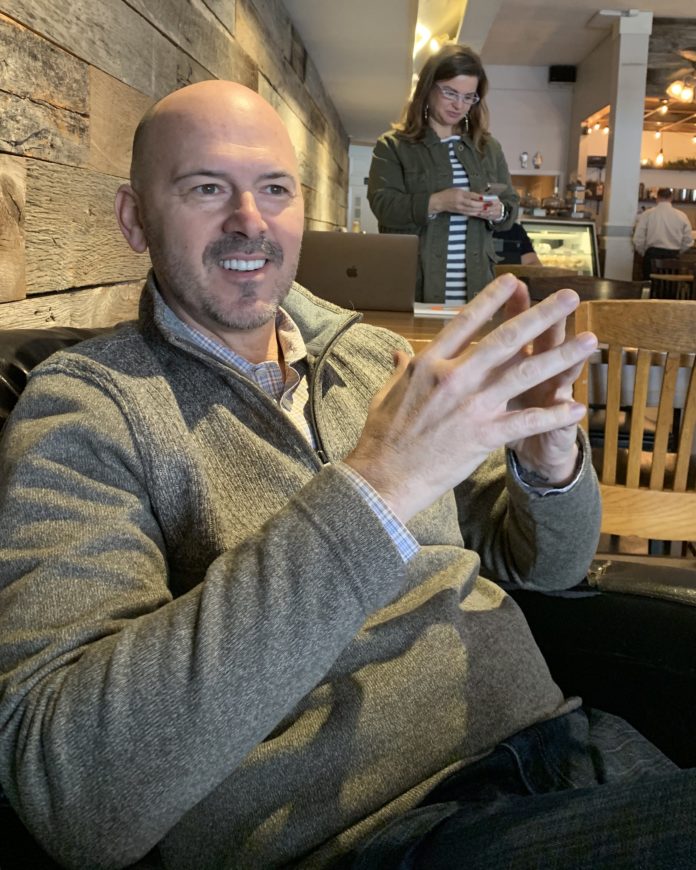By Michelle Price
Special to the UCBJ
Find your niche, love it, and seek to be the best at it. That’s what Mike McCloud, Putnam County native and Founder/CEO of the World Food Championships, has been working on for almost three decades as he led his marketing firm through a world of opportunity.
McCloud is a visionary whose sense of industry trends and knack for good timing has put him on the forefront of some huge marketing movements throughout his career, including what he refers to as “Food Sport” these days.
UCBJ recently sat down with McCloud to get his insights on how a small-town boy built a multimillion-dollar business that serves the needs of some of the largest companies in the world.
How did you go from a “journalist” to an entrepreneur?
I was one of the few, if not only, students in the state of Tennessee who had worked six years, from seventh to 12th grade, on a high school newspaper. The thing about that high school newspaper was that it served as a community newspaper for Monterey. That was an amazing experience as I now look back on it. It taught me about how journalists are connected to their surroundings. And I found that I was always interested in the politics, the business, the people of Monterey as I grew up. Thankfully, The Tennessean noticed me and offered me a scholarship to study journalism at UTK. And from there, the world just kept opening up. So much so that I got to experiment (in college) with business concepts, backed by a catalyst of journalism persistence.
What was the first business you owned or managed?
The first real one? LOL. That’s when I came back to Cookeville right after getting my degree in 1990. I wanted to write, but not about car wrecks, politics, etc. So I started a magazine called Cookeville’s Finest. Over the course of several years, that turned into an ad agency and marketing firm that required P/L sheets, debt, PR, sales, marketing, you name it. Long story short, it forced me to evolve into an entrepreneur who could zig and zag, who could adapt, and who could incorporate new technologies, new ways of communication, into a business that helped other businesses.
What prompted MMA’s expansion into the Nashville market?
Ambition. We had reached a certain point of success in Cookeville, one that I wasn’t sure could go much bigger. Once we crossed over the million-dollar mark in revenue, I looked around and didn’t see any ad agencies bigger than us. And our demand was continuing to grow — which required talent. So I looked at Nashville as an opportunity to answer that need, as well as grow, and I simply forged a path that way. It was circa 1999, and boy, did it have an impact. It doubled our business within probably eight, to 10 months, and it pretty much put us on a course of what I would consider serious business. We had to grow up as a company. We had to get real buttoned up on how we approach marketing campaigns, national initiatives, and entrepreneurial opportunities.
What key steps along the way were important in developing your business career path?
My agency was always adept at numerous niche offerings for a variety of businesses. But in the background, I had always believed that to be truly successful and build a unique firm, we had to find some kind of niche, some kind of focus that enabled us to be the best in the world. At one point, that was publishing special concepts, like violence prevention guides. Then it was politics, specifically things like referendums. (McCloud’s firm has passed more Liquor by the Drink initiatives in Tennessee, including Cookeville, and Kentucky than any other firm.)
That taught us a lesson that if you are a specialist in a certain area, then your reputation proceeds you in a good way and allows you to be compensated appropriately for your knowledge and service.
So was that how you found “Food Sport”?
Kind of. It basically found us. Thanks to one of my great friends and mentors, the late Tony Stone, we got an opportunity to work with the Kansas City Barbecue Society back in 2006, and we approached them in a very unique way about how we wanted to be compensated. We basically proposed a performance-based contract. If they grew and benefitted from our strategies, then we would be compensated accordingly. The result was a sonic boom for us both.
During our tenure with KCBS, we noticed other food verticals becoming popular. And ultimately, we felt like there needed to be one big platform for all of these loosely organized industries. So we rolled up our sleeves and went to work. The outcome was what we called the World Food Championships, which we launched in 2012 in Las Vegas with Caesar’s as a host.
We were taken seriously from the word go because of how we approached it and the legitimacy of what we built into it. I look back on 2012 and think “Oh my gosh, how in the world did we pull that off” because it was much more than what we had bargained for.
But now, we’re going into our eighth event and just signed a long-term contract with Dallas, Texas. It has grown beyond any of our initial thinking, and it has created careers for dozens of very talented cooks and chefs. Aside from the many TV shows we’ve partnered with, the most recent huge development for us has been a partnership with the largest company in the world, Walmart.
That must be truly exciting. Do you still work with local companies?
I can’t wait to put my feet on the floor every day, and our team is now focused at least 90 or 95 percent on WFC. But yes, we still do some marketing support for select companies, friends of mine who helped give me a start my business, and some who are legacy clients that we have worked with for 20 or more years.
How are you approaching expanding your brand that’s made it so successful so quickly?
I’m not sure it’s been quick. A lot of people look at these things, and they talk about the overnight success. Well this has been a 27-year overnight success. I mean every single thing that MMA Creative has done over the past three decades has led to this moment.
It’s been great teamwork. It’s been great people. It’s been a relentless pursuit of effort, drive and ambition. We are probably one of the most passionate groups of creatives that you will ever find, and it’s because everyone in our company loves the people and the mission of what we are doing.
How do you define success?

Numerous ways, especially on the metrics side of the business. But from a personal standpoint, I define success based on the impact our enterprise has on someone’s life. There are intangibles built into any success model that are probably as significant if not more significant than the bottom line.
For example, we had a chef champion in 2014 who had been rescued from gangs and put into the restaurant industry. He worked his way up through the restaurant, became an executive chef and then he found WFC. He came to compete, and then ultimately won, which put $100,000 in his pocket. But that’s not the kicker. What did he do with it? He used it as a way to start a foundation that helps take kids off the streets and helps put them in culinary enterprises. To me, that’s a huge success metric.
What is the single biggest thing you’ve learned in business?
It’s hard to boil it down to one single thing but I will certainly point to clarity. Being very clear about what you expect from a business or a partner and what you plan to deliver and making that crystal clear in your communications, your agreements, and in your delivery of your work. It’s absolutely critical.
Where I grew up … you can look someone in the eye and shake their hand and know you have a deal, and that they are going to follow through and you are going to follow through. That’s not always the case when you are dealing with a company that’s a thousand miles away from you, or a business person you’ve met for the first time.
How do you organize your busy life?
I triage it and it basically apply a relentless attack of communication protocol. I have found that there’s four courses of action with every message in business: 1) delete things that are irrelevant to the success of your business; 2) delegate things that someone else on your team can handle; 3) respond to things that only you can satisfy; and 4) file away things you want to address at a later date.
What is the biggest lesson you’ve learned about yourself?
I am driven by achievement and I think it goes back to my roots as a journalist. Your job as a journalist is never done until you meet a deadline. The beauty of that is that it’s measurable. You can see the result of your work in the form of an article that is published. So in my life today, that might be a website. A press release. An associate promotion. A successful event. Regardless of the subject, its completion is an achievement. And if you do that enough, you build a certain momentum in business. And I certainly like momentum.
What is your favorite quote?
I carry this lucky, iron-crafted clover charm in my pocket, every day. And on it, it says: “May your day be filled with blessings, like the sun that lights the sky, and may you always have the courage to spread your wings and fly.”
If you had to recommend two books for someone starting out in business, what would they be?
Outliers and Blink. Both are by Malcolm Gladwell.
What was the best advice you ever received?
I had a very important business person in this community, who has now passed on, who once counseled me during what I thought was a crisis. I iterated numerous things to him that I thought needed to be done. But he just smiled as he reclined in his seat, cool as a cucumber, and looked me dead in the eye before saying, “You know, Mike, sometimes the best thing to do is nothing at all.”
Now, I did not take that advice in that situation, but there have been many times in my career where I have realized while facing certain challenges that the best thing to do IS nothing. That’s not easy to do for someone who likes achievement and momentum!
You now have a 14-month old son. What advice would you give Tucker in say 15 years?
I think I would say to him, “Don’t be afraid to dream of what’s possible but never forget to know what’s practical.”
When it’s all over, how do you want to be remembered?
I hope that people see that I was always passionate about my work. I wasn’t always perfect, but I was extremely focused and driven about achieving meaningful things. Whether that was the Upper Cumberland Business Journal, or this thing on national TV called World Food Championships.
Full Disclosure: Mike McCloud is the founder and publisher of the Upper Cumberland Business Journal, which began publication in January 2005.









